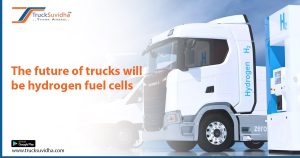The future of trucks will be hydrogen fuel cells.
For the logistics industry, hydrogen fuel cell vehicles are the best option. There will be a significant increase in the number of hydrogen-powered vehicles on the road in the coming years, including fuel cell trucks. Unlike batteries, which store electrons directly to power electric motors, hydrogen fuel cells for trucks use tanks to store energy in the form of molecules in gaseous or liquid form.
Fuel cells transform hydrogen into electrons, water, and water vapour. The electrons then drive the truck’s electric motors. Similar to diesel engine trucks, hydrogen combustion trucks use combustion engines to burn hydrogen. Aside from electrolysis, which uses electricity to separate hydrogen from oxygen, the required hydrogen can be also produced by reforming natural gas and capturing carbon dioxide (CO2).
The technology required for fuel cell trucks and hydrogen generation is already well developed and used by many automakers. Furthermore, in addition to vehicle benefits, hydrogen has infrastructure benefits. Hydrogen is already gaining traction in industries other than transportation, reducing the risk of investments in hydrogen production and transportation. Because it does not require grid upgrades and has a lower carbon footprint, the infrastructure is less expensive to build on a large scale than e-truck charging infrastructure. Because of the faster refuelling speed, hydrogen infrastructure can support far more trucks than charging infrastructure.

As a result, the business case for hydrogen infrastructure is becoming more appealing as hydrogen sourcing costs fall and vehicle demand rises. When compared to batteries, hydrogen-fueled trucks can refuel faster and carry a lower weight penalty because tanks weigh significantly less than batteries. Hydrogen trucks can thus be actually deployed on a similar scale as diesel trucks, but with the added benefit of producing no emissions. It also implies that they will be less expensive to operate in the long run than diesel trucks.
What are the advantages of a hydrogen fuel cell vehicle?
The benefit of hydrogen fuel cell electric vehicles (FCEV) is that they emit only water vapour and warm air and have no tailpipe emissions. Another advantage of hydrogen fuel cell vehicles is that they are more efficient than vehicles powered by internal combustion engines. Hydrogen fuel cell electric vehicles have another advantage in terms of refuelling time, making them more practical for public transportation than battery-powered electric vehicles. Even with the most advanced charging technologies, charging a battery-powered electric bus could take hours.
However, a fuel cell vehicle can refuel with hydrogen in a matter of minutes, which is almost as quickly as a traditional internal combustion engine can refuel with fossil fuels.
When is it appropriate for a transportation company to use a fuel cell truck?
Fuel cell trucks will be ideal for long-distance travel and heavy, energy-intensive tasks. It will also be a wise choice when there is no time for battery charging, such as on trucks that run around the clock. Furthermore, fuel cell trucks can be a good option in countries and regions where it is not possible to fast charge a battery electric truck due to electric grid limitations.
Are hydrogen fuel cell vehicles environmentally friendly?
It is important to note that using a battery-powered electric vehicle does not imply that the vehicles produce no greenhouse gas emissions, but rather that they produce no tailpipe emissions. Because the majority of the country’s electricity get generated from fossil fuels, and the world’s largest source of hydrogen is also currently generated from fossil fuels, the use of these vehicles produces a significant amount of carbon emissions. But, just as we are moving towards renewable energy sources for electricity, we may also be moving towards renewable hydrogen generation methods in the coming years. Even if these vehicles currently contribute to emissions, the fuel they require could be actually produced using renewable methods such as solar and wind energy.
Visit us – www.trucksuvidha.com for more details .




Recent Comments